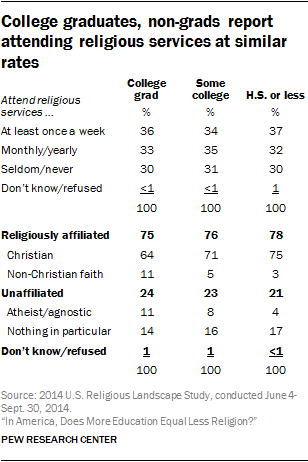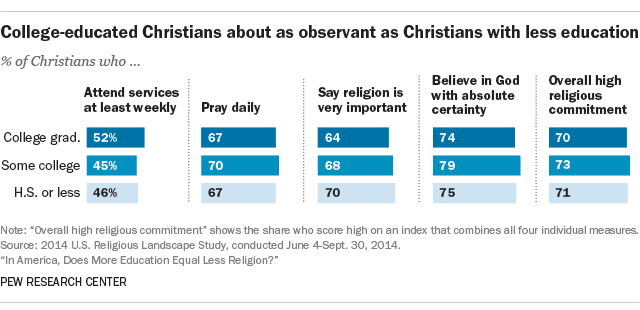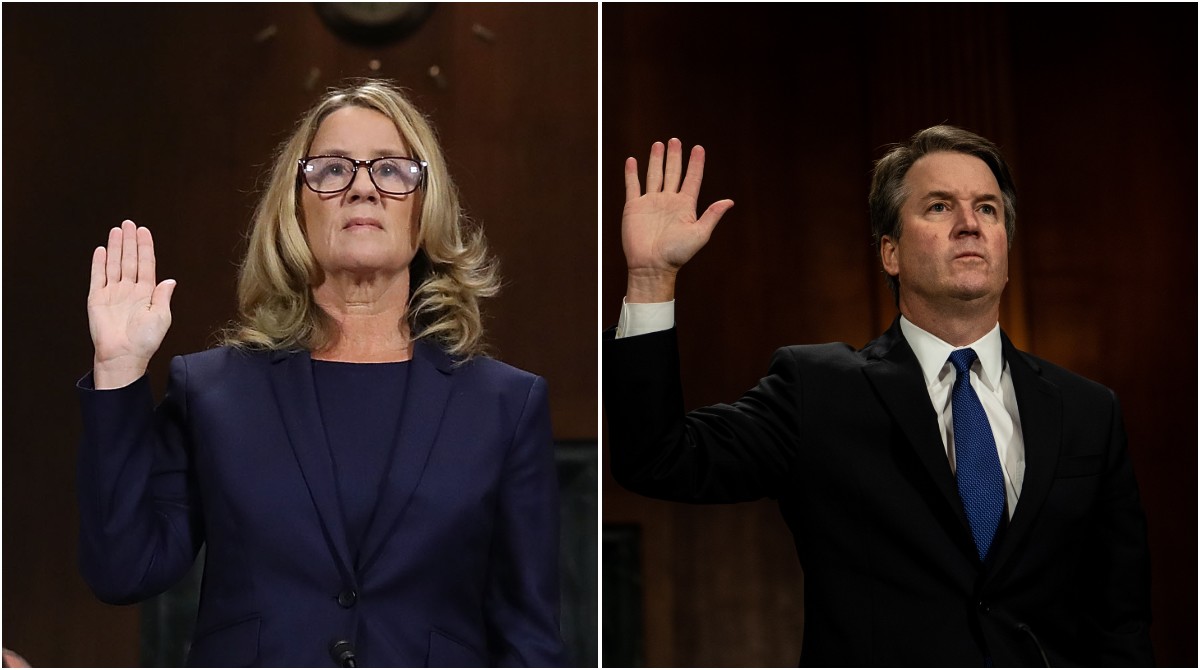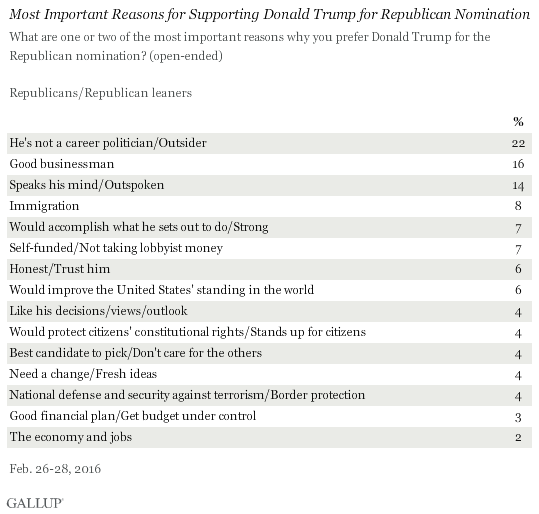Kavanaugh has been cleared from the committee to the Senate floor. Sen. Jeff Flake, a crucial swing vote, has said he will vote for Kavanaugh on the floor if and only if an FBI investigation of no more than one week is completed into the claims. Trump has authorized such an investigation, saying that it must be no more than one week and may only look into currently pending credible allegations.
In the coming week, our national discourse will center around the issue of whether or not Kavanaugh should be confirmed.
And in all of the talking, we will make points either for or against Kavanaugh’s nomination, some points good and some points bad. These points will form part of a narrative, making up a way to look at the issue. And as we argue, more and more of the narrative will get beaten down to just the central nuggets of it, which I’m going to call a meta-narrative. While the narrative is formed from the arguments we make and the stories we tell about the situation, the meta-narrative is what motivates our formation of those narratives. And so in the interest of pushing us along further, I think I’d like to strip us down to just the meta-narratives in this discussion.
Hopefully, knowing what the meta-narratives are can help us discuss this in a way that isn’t emotionally traumatic to too many people, and get closer to the truth of what we want as a nation.
I’d like to say that there are two, but I think there are four. Two of them I consider beneath consideration. Those two are as follows, with the names I will give them for this post:
- Liberalizing: Kavanaugh can’t be confirmed because he will be Trump’s second SCOTUS nominee and the 5th conservative on the Court, after which, for a long while, we can expect the Court to rule in favor of conservatives in any major political issue.
- Conservatizing: Kavanaugh must be confirmed because he will be Trump’s second SCOTUS nominee and the 5th conservative on the Court, after which, for a long while, we can expect the Court to rule in favor of conservatives in any major political issue.
No one would ever say that this is their position; but people do in fact hold these meta-narratives, and they bubble forth in the sorts of arguments that they will end up making either for or against. I think these are beneath consideration because they are sub-rational and purely tribal. Notice that neither of these meta-narratives really cares about whether Kavanaugh is guilty, whether Dr. Ford is telling the truth, whether or not Kavanaugh has been unfairly smeared by the press for the auxiliary other charges, or anything. It only cares about who has the Court. And honestly, it’s a sad disgrace to our nation that we’d go to this level.
In the Liberalizing meta-narrative, any charge, at all, is worth disqualifying him over, no matter how ridiculous. Kavanaugh fighting on a boat in Rhode Island? Sure, why not. Kavanaugh participating in organized gang rape rings as a teenage boy of 15? Sure, why not. Throw whole fistfuls of spaghetti against the wall, see what sticks.
In the Conservatizing meta-narrative, no charge, at all, is worth disqualifying him over, no matter how credible or serious. Ford is probably lying; but if she isn’t, then she’s probably misremembering; but if she isn’t, then it doesn’t matter because it was a long time ago; and it wasn’t even that bad anyway, she should get over it.
So let’s just table these two indefinitely. Real people are driven by these meta-narratives, but they are really only strawmen positions. Let’s look to rational people, who want to examine the issue fairly, if not dispassionately. These meta-narratives, to me, are the ones worth discussing.
- Victim-Affirming: The confirmation on Kavanaugh is a referendum on how we as a nation respond to survivors of sexual assault and rape. If we deny him the Court, we are sending the message to millions of women (or men) that when you come forward we will hear you and we will take action, even at the highest levels of power. And if we vote to confirm him, we are sending the message to those same millions that we won’t take you seriously and your voice is powerless.
- Decency-Affirming: The confirmation on Kavanaugh is a referendum on how we as a nation respond to the ritual defamation tactics exhibited by Democrats, the press, and others driven by the Liberalizing meta-narrative. If we confirm him to the Court, we will deny this sort of tribalistic tactic and prevent it from being reinforced and send the message that this will not work. If we deny him the Court, we are sending the message to Democrats (and then to Republicans, and then to the nation more broadly) that when we do not like your opinions on politics, we have carte blanche to descend to the level of the Salem witch hunts in attacking every aspect of you we can find.
Now, if you’re politically liberal, then I know that you’re probably wondering why you should care about the Decency-Affirming meta-narrative. I know that you don’t like Kavanaugh, and you probably think he is actually guilty, and if he is actually guilty then why do we care about his reputation? I’ll get back to that.
The Victim-Affirming and Decency-Affirming meta-narratives provide an outlet that is actually concerned with the factual guilt or innocence of Kavanaugh under the claims. Even if you think Victim-Affirmation is essential, you might not think it’s that essential when the person is innocent; and even if you think Decency-Affirmation is essential, you might not care all that much if the charges are actually true. Both meta-narratives are serving ends beyond tribal politics, and ends that I’m going to say are both good.
Here are a few things we can draw from recognizing that both of these meta-narratives exist:
Firstly, if you are a victim of sexual assault, or a strong ally for victims of sexual assault, then please understand that anyone you know who is wavering towards Kavanaugh or firmly pro-Kavanaugh is probably not arguing within the same meta-narrative as you. Which is to say, you are interpreting a support of Kavanaugh within your meta-narrative, where supporting him means telling other survivors not to bother coming forward. Whereas the support may in fact be coming from the Decency-Affirming meta-narrative. No one is intending to send you this message, even though that is unfortunately the message being sent.
Secondly, if you are strongly concerned about the smearing of Kavanaugh in the press, then please understand that anyone you know who is leaning to Dr. Ford’s side or firmly and strongly on her side is also probably not arguing within the same meta-narrative as you. They are not necessarily intending to support the behavior of the Democrats or the press, even though that is also unfortunately the message being sent.
Seeing how both Victim- and Decency-Affirming meta-narratives send a bad message without intending to, I really hope will help both sides understand how this message can be sent, regardless of intention.
Thirdly, as mentioned but really worth reinforcing, the messages get sent regardless of intention. If you only want to send the message that we will believe and take seriously witnesses, then you also send the message that we can perform this same circus again in the future and it will work. Maybe we’ll do it when it’s your guy up to the bench; or even when you yourself are u to the bench. And if you only want to send the message that this circus is intolerable, indecent, and a threat to our democracy that we won’t stand for… then you also send the message that we’re not going to listen to future survivors of sexual assault. There’s no way to send both desired messages. There’s no way to send either desired message without sending an undesired message. That’s where we are.
And so I think this suggests a synthesis meta-narrative that will better serve us in this discussion.
- Synthesis Meta-Narrative: We want to affirm the survivors of sexual assault, but we also want to strongly condemn the tactics of ritualistic defamation and press libel campaigns and set high standards. We can’t do both, and we need to decide which message is more important to send.
Now we are somewhere, at least, because I think reasonable people driven by this meta-narrative can see good and bad on both sides. We can construct points and arguments around this, and not have to assume someone else is holding a strawman position such as “witch hunts are cool” or “I like rapists.”
But hold on, you say. You’re a reasonable person, and you really don’t get the problem in the Decency-Affirming meta-narrative.
I can understand it. I am not a Republican, but I do lean conservative. I was very disappointed by Kavanaugh’s nomination. In his past, he has been instrumental in the Patriot Act and ruling on cases that greatly expand the power of the government to invade our privacy and kill us. Like many on the left, I too immediately thought he looked like a frat-boy douchebag and spoke like he was about to go to a kegger with the broskis (and like many on the left I that means I immediately didn’t like him). When the allegations came out, I was already indifferent on him, and was ready to put him away and move on to the next judge (hopefully Amy Coney Barrett), without even really caring if the charges were absolutely positively true.
But as the week progressed and more and more people driven either by the Liberalizing or Conservatizing meta-narratives made their arguments, things ramped up more and more. The Conservatizers’ denial that any of it mattered no doubt spurred the Liberalizers to think of even more things to bring out hoping just the sheer volume of charges would make it impossible to look away from them. I actually thought the Republicans on the committee (not the Republicans on random facebook comments; but the ones on the committee) were very accommodating to the charges, while the Democrats were clearly using the charges to their own political ends.
The insanity that gripped our media institutions closely resembles ritualistic defamation, afore alluded to. This is a process identified by Laird Wilcox back int the 90’s, which describes the mentality of the Salem witch hunts, the McCarthy hearings, the anti-Jewish pogroms of Europe, and the violence of the Inquisition. You can walk through those points and see how all of them are applicable here. Some key points of this are: that the defamation is ultimately indifferent to the actual charges presented, and only begins because a social taboo is violated; the subject of the defamation becomes the representation of the worst form of the accusation (such as a leader of organized rape gangs); and any form of defense is irrelevant and interpreted only as further evidence of guilt.
All this withstanding, I decided firmly that I was not going to let the behavior of the Democrats and their press influence my opinion on the truthfulness of Dr. Ford. I would listen to her present her testimony, and on the basis of the hearings come to my own conclusion on what to think about this all.
And she totally sold me. I can’t not believe that she’s telling the truth. And if I believe she’s telling the truth, the logical conclusion is that Kavanaugh did try to assault her and is thereby disqualified (both for the assault itself and for lying about it under oath).
All of this to say, I understand why you wouldn’t care about Kavanaugh: you think he’s a douchey frat boy who tried to rape a girl.
So then, don’t be worried about Kavanaugh, specifically. Be worried about yourself, your friends, your family, your future sons or grandsons, or other men close to you. Just like you aren’t worried about Dr. Ford specifically, but worried about all the women in your life who might have been abused in the past or future by someone like Kavanaugh.
Setting aside Dr. Ford and her allegations (as I think they are vastly different), from the time she came forward with her story the press has been breathlessly repeating everything they can get anyone to say. They have canvassed basically the entire population of 1980’s Maryland hoping to find anyone else who is willing to say anything else about Kavanaugh. And the things they came up with were absurd on their face. The charges became so ridiculous newspapers have had to print retractions or clarifications or started refusing to print them in the first place. The Democrats have repeated these and encouraged this behavior. There could have been a way to settle this issue discretely, without a media circus, by means of a confidential Senate investigation. The Senate has those means. The witnesses could have been interviewed in person under threat of perjury, the evidence could have been examined, and a conclusion reached long ago, without having to bring either Dr. Ford or Kavanaugh out into the public for it. The Democrats purposefully did not do that, because they needed the last-minute feeding frenzy to delay the vote. The Democrats’ goal is really simple. They don’t care about Ford, they don’t care about her feelings, they don’t care about whether she was assaulted, they only care about the letter after Kavanaugh’s name (R) and keeping one more of those letters off the court.
Is this an acceptable way for a democracy to work? Is this even a functional way for a democracy to work?
I don’t think it can be. I don’t think we will be able to live together as a society if we can’t agree that this is not an acceptable process.
An acceptable process, as I alluded to, would have respected the confidentiality of Dr. Ford and not brought her name into the press, while at the same time investigated the serious and credible claims to see what other corroborating evidence could be found.
Today it’s Kavanaugh, and yeah, Trump appointed him and Trump’s bad. But in ten years Trump will be gone, and this new norm will remain. In ten years it will be you. And whether you’ve ever sexually assaulted anyone or not, we will know all it will take is the accusation that you did, and suddenly your entire life and career will be over, with global newspapers reporting you guilty of the very worst crimes a private individual is capable of. The standard is not being set at the level of “guilty”; it is going to be permanently set at the level of “accused.” And while it’s not all that hard to avoid sexually assaulting anyone in your life, it’s a lot harder to be able to prove that you’ve never sexually assaulted anyone in your life. This will not stay with Kavanaugh. This will become the new norm in all society as we quickly approach an abyss that I’m increasingly worried bottoms out in another civil war.
I realize now that I’m not giving any voice to explaining the Victim-Affirming side. That’s mostly because I consider it self-evident that telling survivors of sexual assault to stay silent is bad, whether we say it unintentionally or not. It’s also because I think I’m largely aiming this at reasonable liberals, who I assume are already there. But just for the sake completeness, rape or sexual assault is a terrible and evil thing, and when a woman (or a man) has suffered it, it is very difficult to come forward. It makes you feel weak and vulnerable, and also ashamed of yourself. The experience is traumatic, and most who suffer it want to just forget it and not give it any more space in their heads. Coming forward is extremely difficult for the survivors, but it is also extremely important that they do come forward. We need a world without rape or sexual assault. And we can move to that world only if the survivors of abuse feel confident in coming forward that they will be accepted and heard. And that respect for victims is also essential to the fabric of our society. So it is important that we believe Dr. Ford, especially after her very vulnerable sworn testimony.
So what do we do?
I don’t know, really.
We can look at the evidence. If Kavanaugh is guilty, then he’s disqualified. On multiple levels. No need to worry over negative messages.
But there isn’t a lot of evidence to help us decide this, and the evidence that exists is exculpatory. He kept a detailed calendar-diary of the summer in question that he clearly marked with his ongoings and whereabouts. The only entry that has been found that might the incident Dr. Ford described the entry for Timmy’s house, and it seems that Timmy’s house is actually 10 miles away from the Chevy Chase country club (according to information in the linked thread on democraticunderground), essentially ruling that option out. There were witnesses who Dr. Ford said were there, but they have said they either do not remember it or that it did not happen. We have Dr. Ford’s credible allegation, and Kavanaugh’s credible denial, the denial of witnesses, and a piece of exculpatory evidence.
A further piece of evidence may come in the form of what “boof” means. Many point to this as a possible lie. Kavanaugh said this was a fart joke, but according to many that is definitely not what it means. Since that isn’t what it means, that means Kavanaugh is guilty of perjury, and perjury disqualifies you from being on the Supreme Court. Whether you did rape a girl or not. If Kavanaugh lied during these questions, then we can dismiss him. However, I’m not sure how you can ever prove someone is lying about what he meant when he used a slang word 30 years ago.
Looking at the evidence that exists, it seems that Kavanaugh is probably innocent.
But then how do we make sense of Dr. Ford’s testimony? How can we possibly fit that into a picture of Kavanaugh’s innocence?
I again don’t know.
Now, I’d like to reiterate. If the Liberalizing narrative hadn’t been spun about Kavanaugh raping puppies in New Mexico while free-basing the ashes of Hitler or whatever else it is, then I would think that Dr. Ford’s testimony, all by itself, would be enough to disqualify Kavanaugh, without new information. I think it wouldn’t matter because there would be no negative message to send by simply voting no on his nomination.
But that narrative was spun, and now there is a negative message to send. And so I think we need a good reason before sending either.
I think that in the week ahead, we will get to this Synthesis meta-narrative, and start arguing about which message we really need to send. And I think most people are going to side with the Victim-Affirming side. And so I think Kavanaugh will ultimately not be confirmed.
In the meantime, I suppose the FBI investigation is the closest to a kind of compromise we can come to in the meta-narrative. It sends the message that we’re taking the claims seriously, or at least seriously enough to postpone a vote and investigate them. If the investigation finds nothing new (and I doubt it will), then Kavanaugh can be confirmed without necessarily sending the message that the allegation wasn’t taken seriously (obviously some people will still see it that way, but it is not as direct). If the investigation does find something new and finds Kavanaugh is guilty, he can be denied without sending the message that the ritualistic defamation that followed Dr. Ford’s allegation is also good.
Part of the problem, of course, will be when people driven by the Conservatizing or Liberalizing meta-narratives learn this, and begin using these talking points to their own strictly tribal ends. They are served by the fact that we have to send one of these messages, so even if a compromise is pointed out, it is in their interest to convince us that the compromise is not a compromise. They will be very loud about this.
In closing, I hope people of good faith on both sides of this divide can better understand why other people of good faith might be on the other side. I hope you can understand how to better have this conversation, to hopefully move us closer to the truth of the matter and to a best course of action. Disagreement with you doesn’t make someone evil or irratonal. There are irrational people in this discussion, and they exist on both sides. If we can agree on nothing else, let’s at least agree to politely ask the irrational people on our own side to shut up, so the adults can talk about this very serious problem facing our nation.
















